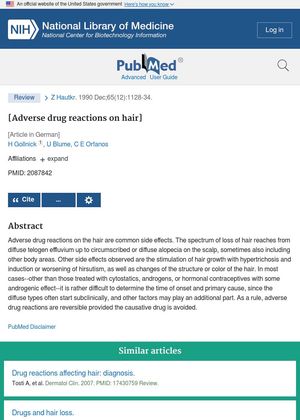Adverse Drug Reactions on Hair
December 1990
in “
PubMed
”

TLDR Some drugs can cause hair loss, increase hair growth, or change hair color, but stopping the drug usually reverses these effects.
The 1990 review discussed the adverse drug reactions on hair, which were common side effects at the time. The range of hair loss varied from diffuse telogen effluvium to circumscribed or diffuse alopecia on the scalp, and sometimes included other body areas. Other side effects included the stimulation of hair growth with hypertrichosis, induction or worsening of hirsutism, and changes in the structure or color of the hair. Determining the time of onset and primary cause was challenging, especially for diffuse types that often started subclinically and could be influenced by other factors. However, these adverse drug reactions were generally reversible if the causative drug was avoided.




